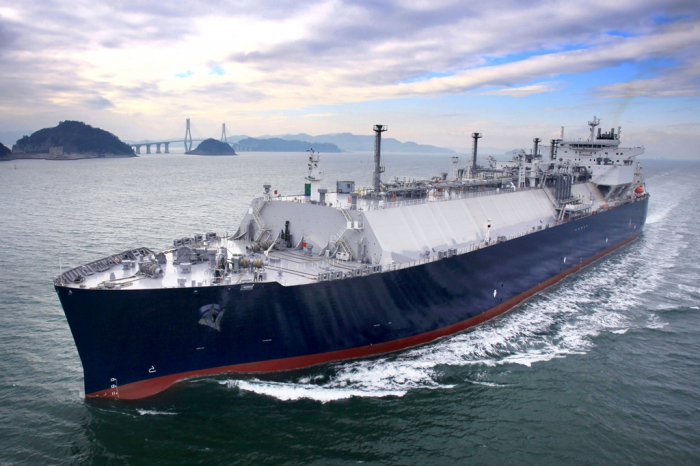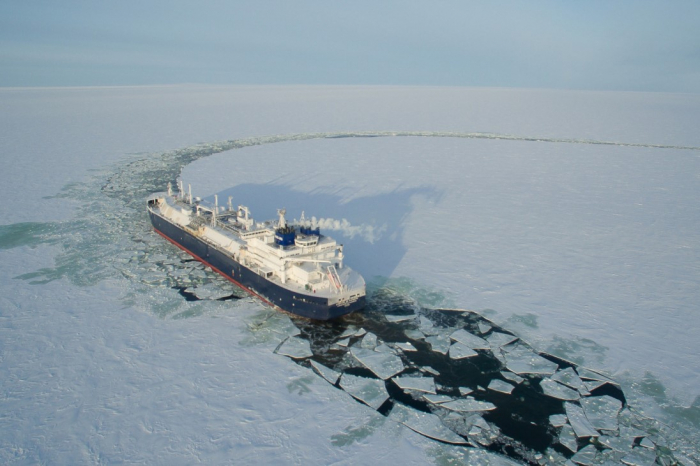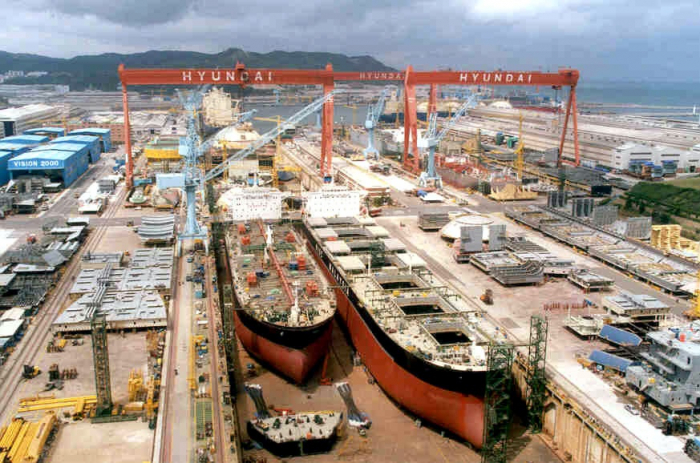Business & Politics
War in Ukraine: Risk and opportunity for Korean shipbuilders
Order cancellations could open the door for newbuilding for other buyers at higher prices, analysts say
By Mar 04, 2022 (Gmt+09:00)
3
Min read
Most Read
Alibaba eyes 1st investment in Korean e-commerce platform


Blackstone signs over $1 bn deal with MBK for 1st exit in Korea


OCI to invest up to $1.5 bn in MalaysiaŌĆÖs polysilicon plant


Korea's Lotte Insurance put on market for around $1.5 bn


NPS loses $1.2 bn in local stocks in Q1 on weak battery shares



The escalating conflict between Russia and Ukraine is posing both a risk and an opportunity for South KoreaŌĆÖs three largest shipbuilders, which have a combined $8.05 billion worth of orders from Russia.
The Korean trioŌĆÖs orders secured from Russia are largely for LNG carriers and offshore projects, accounting for 8% of their total order backlog of $97.8 billion as of the end of January.
Analysts said the Korean Big Three ŌĆō Korea Shipbuilding & Offshore Engineering Co. (KSOE), Daewoo Shipbuilding & Marine Engineering Co. and Samsung Heavy Industries Co. ŌĆō may face order cancellations or refusal of ship deliveries from the Russian companies in the wake of Western sanctions against Russian banks and state-run energy firms.
Under intensified sanctions against Russia, the US and Europe have excluded Russian banks from the global financial settlement system SWIFT. The US has also imposed financial restrictions on Sovcomflot, RussiaŌĆÖs largest shipping company, as part of the broader sanction moves to hold Moscow accountable for the invasion of Ukraine.
The Korean Big Three, also the worldŌĆÖs top three shipbuilders, said their Russian orders included those from Sovcomflot and Novatek, RussiaŌĆÖs largest independent natural gas producer.

RUSSIAN BANKS, ENERGY FIRMS ON SANCTIONS
Following the Western sanctions, Novatek might have to put the development of its LNG projects in the Arctic on hold as it will not be able to get needed financing, according to industry officials.
Currently, Samsung Heavy has $5 billion in order backlog from Russian companies, followed by Daewoo Shipbuilding with $2.5 billion and KSOE at $550 million. Their Russian orders are mostly for the construction of ice-breaking LNG carriers to be used in Arctic natural gas development projects.
If Russian companies refuse to accept the ice-breaking LNG tankers built by the Korean shipbuilders, it may be hard to find other buyers, given that those ships are special-purpose carriers, unsuitable for general-purpose transportation, industry officials said.
Another risk for Korean shipbuilders is the industry practice that shipping companies pay half the ship prices at the time of delivery, meaning higher chances of not receiving the money in the case of Russian orders.
ŌĆ£We are closely monitoring the situation. We donŌĆÖt expect bad news, but at the same time, weŌĆÖre preparing for the worst-case scenario,ŌĆØ said an official at a Korean shipbuilder.

PRICES OF LNG CARRIERS RISING
Some analysts, however, say that potential cancellations could prove to be an opportunity for Korean shipbuilders to make more gains if they can find other buyers when the newbuilding prices for LNG carriers are rising.
According to the global market researcher Clarkson Research Service, the average price for a 174,000-cubic-meter LNG carrier stood at $218 million as of the end of February, up more than 20% from the high season in 2020. LNG shipbuilding prices have been on an ascent in line with the growing demand for LNG as an eco-friendly fuel globally.
ŌĆ£If Russian companies cancel their orders at an early time, Korean shipbuilders can use the slots in their dockyards to build for others at higher rates, reflecting the rising price trends,ŌĆØ said KTB Investment & Securities analyst Choi Gwang-shik.
According to the brokerage firm, half the orders that the three Korean shipbuilders have secured from Russian companies are for deliveries after 2024, meaning that the construction of those ships hasnŌĆÖt started yet.
ŌĆ£The Russian crisis presents both risks and opportunities for Korean shipbuilders,ŌĆØ Choi said.
Last year, the three major Korean shipbuilders swept global orders for LNG carriers, more profitable than oil tankers and container ships, amid signs of a global economic recovery from the pandemic.
Ship operators have increased their new vessel orders to meet rising seaborne transportation demand, boosting freight rates and new shipbuilding prices.
With major economies around the world attempting to cut emissions to meet net-zero targets, the┬Āshipping sector has been looking for ways to cut the environmental footprint┬Āof its operations.
Write to Jung-hwan Hwang at jung@hankyung.com
In-Soo Nam edited this article.
More to Read
-
 Shipping & ShipbuildingKorean shipbuilders set for more orders on Ukraine crisis
Shipping & ShipbuildingKorean shipbuilders set for more orders on Ukraine crisisFeb 23, 2022 (Gmt+09:00)
3 Min read -
 Shipping & ShipbuildingBig 3 Korean shipbuilders win largest orders in 8 yrs
Shipping & ShipbuildingBig 3 Korean shipbuilders win largest orders in 8 yrsDec 31, 2021 (Gmt+09:00)
2 Min read -
 Shipping & ShipbuildingKorean shipbuilders win record LNG carrier orders; 2022 outlook bright
Shipping & ShipbuildingKorean shipbuilders win record LNG carrier orders; 2022 outlook brightDec 08, 2021 (Gmt+09:00)
2 Min read -
 Shipping & ShipbuildingDaewoo Shipbuilding, Samsung Heavy win LNG carriers order from Qatar
Shipping & ShipbuildingDaewoo Shipbuilding, Samsung Heavy win LNG carriers order from QatarNov 08, 2021 (Gmt+09:00)
1 Min read -
 Shipping & ShipbuildingKorean shipbuilders await improved earnings as LNG carrier price hit all-time high
Shipping & ShipbuildingKorean shipbuilders await improved earnings as LNG carrier price hit all-time highSep 19, 2021 (Gmt+09:00)
1 Min read -
 Shipping & ShipbuildingKoreaŌĆÖs big 3 shipbuilders aim to hike newbuilding prices
Shipping & ShipbuildingKoreaŌĆÖs big 3 shipbuilders aim to hike newbuilding pricesAug 02, 2021 (Gmt+09:00)
3 Min read
Comment 0
LOG IN


